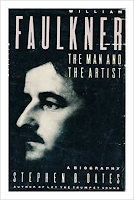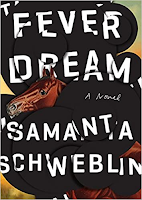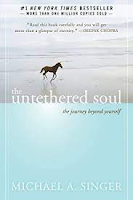
What can we say about 2020 that hasn’t been already said
(and continues to be said, as we fight our way through the dregs of it)? Well,
how about…I read more books this year! There’s one
positive outcome. Through this endless expanse of homebound months, I read 44
books, up from 30 last year. In my finished pile this year: 29 novels, 4 short
story collections, 5 memoirs, 3 poetry collections, and one autobiography. Last
year, I said I wanted to read more biographies this year, which I did not do,
and more young adult fiction, which—in part, thanks to my teaching job—I did.
It should be noted that one of the books I read this year was a graphic novel,
and I expect to have that as a new category in 2021, considering the
eagerly anticipated stack on my shelf right now. I also expect to continue
reading memoirs in the coming year, particularly those that experiment with
form. From time to time, I work on my own strange-form
memoir. And I’m beginning to formulate my summer reading project, which will
have something to do with place as character—specifically, with houses. If you
favor a book in which a house is one of the main characters, kindly send me
your recommendation.
So many of the books I read in 2020 struck a deeply personal
chord with me. Perhaps my antennae were open and receiving to emotionality
during this unprecedented year; perhaps those were the type of reads that
caught my eye and attention. In the end, it doesn’t matter. So many books were
a balm for me this year. Of my ten favorite reads, most had some sort of
autobiography or memoir element, whether it be direct, poetic, auto-fictional, or something else. As always, I enjoy
reads that inspire contemplations about genre although in the end, it doesn’t really
matter. Feeling in writing is what breaks through, at least for me.
In no
particular order, my favorite reads of the year:
Glen Rock Book of the Dead by Marion Winik (2010)
After a discussion about writing memoir, my friend and
colleague (thanks, Jessica!) said I would love this slim memoir, and I did. In
chronological order throughout short chapters, Winik reminisces about people
she has known who died. Each section is titled (i.e. The Eye Doctor,
The Bon Vivant, The Graduate); some are people quite close to her and some are
known through others. All left an imprint on her and as she writes about these
losses, much more is revealed about Winik herself, life in general, and the
times we live in. A unique, surprising—and ultimately, touching read.
Department of Speculation by Jenny Offill (2014)
This novel reads like a series of journal entries, short observations
from the point of view of a mother, a wife. When the marriage falters due to an
infidelity, she retraces the events of their relationship, trying to find a way
forward. She talks about the isolation and fulfillment of motherhood, and about
striving for a creative life amidst life’s demands. She notices patterns and
brings up things she’s read and learned, all in a concentrated effort to make sense of
life, her life. I loved this book. Like the best poetry, I often wanted to take
my eyes from the page after reading a section and lean back, enjoying the
ripples of association. Another unique, contemplative and beautiful read.
The Carrying by Ada Limón
How does one speak about poetry, about a collection that
speaks to so many deep truths? In this stunning book of poems, Limon shows the
range of human experience, the burdens and joys we carry from beginning to
end. Maybe it’s best if I share my favorite.
After the Fire
You ever think you could cry so hard
that there’d be nothing left in you, like
how the wind shakes a tree in a storm
until every part of it is run through with
wind? I live in the low parts now, most
days a little hazy with fever and waiting
for the water to stop shivering out of the
body. Funny thing about grief, its hold
is so bright and determined like a flame,
like something almost worth living for.
Between the World and Me by Ta-Nehisi Coates (2015)
This National Book Award winner garnered many more accolades
in the year it was released and it’s been on my shelf for some time. Written as
a series of letters to his son that touch on the history of African Americans
in this country, Coates describes his own life experiences within the framework
of racial inequity. In describing what it’s been like for him to survive and
make his way as a black man, he also he expresses his fears and hopes for his
son. Toni Morrison called the book “required reading,” and CNN named it one of the
most influential books of the decade. I only wish I had gotten to it sooner.
Late Migrations: A Natural History of Love and Loss by Margaret Renkl (2019)
This captivating, introspective book marries grief with hope,
and reminds us that humans exist within the folds of nature. Renkl has
experienced many of the life changes we all experience: marriage, children,
aging parents and loss. In chapters that alternate between memories of family
stories, episodes of love and grief, and observations of the plant and animal
life outside her back door, a narrative emerges: we are all part of the world,
good and bad, bloom and decay, happiness and pain. For me, reading this book
was akin to having your hand held. A wise, comforting, and beautifully written
book.
Based on a True Story (2017) by Delphine de Vigan
The only end-of-year entry from my Summer of France reading (I wrote more about it here),
this international bestseller is a surprising and wholly entertaining read. It’s
fiction (or is it?), a suspenseful read that follows the friendship between
Delphine (the character), who is a writer, and the mysterious woman who
reemerges from her past (or has she?). The suspense lies, in part, in figuring
out which parts are true, might be true, couldn’t be true. It’s a compelling
read with a dark undercurrent. As I said, a great diversion for the elements of
the story, but it managed to be an exploration of literature too, and how we
determine what is true/real and what is fiction/imagined. And if you’ve been
paying attention to the books on my 2020 list so far, you will know that this
is a current exploration of mine as well.
The Poet X by Elizabeth Acevedo (2018)
Another National Book Award winner (in this case, for Young People’s
Literature), this novel-in-verse tells the story of Xiomara,
an Afro-Latina teen who finds her voice through spoken word and poetry. Acevedo
says she wrote the book to shed light on the experiences of girls who aren’t often
the protagonists of novels. This coming-of-age story addresses religion, the
first spark of sexuality, family pressures, and the powers of creative and
self-expression. An engaging read, it’s beautifully
crafted and packs much emotional resonance.
The Book of Boy by Catherine Gilbert Murdoch (2018)
This middle grade novel takes place in the Middle Ages. Boy
is a child who has survived the plague but lives in a village desiccated by not
only disease, but generations of war as well. When a mysterious pilgrim arrives
and chooses Boy to accompany him on a quest to collect the relics of St.
Peter and return them to Rome, the adventure of his life begins. It’s a quest story,
but so much more, because Boy has much to learn on this pilgrimage—about true spirituality
and morality, about the bonds that join people, and about his own true nature.
I loved this book for its unique setting, and for the surprising layers in this
lovely story for young people.
Eleanor Oliphant is Completely Fine by Gail Honeyman (2018)
The main character of this novel, Eleanor Oliphant, is
somewhat of a misfit. Her social skills are questionable, she often says the
wrong thing, and she doesn’t spend time with people all that much. When she
meets Raymond, a similarly eccentric type, their relationship is the catalyst
for her journey back into life and love. This book is funny and smart and full
of unseen twists, introducing a character you will remember for a long time.
It may seem strange for me to compare this book to the last one on my list—The Book
of Boy—but it strikes me that they are similar in many ways. Both are about the
redemption available when two unlikely hearts meet.
Olive, Again by Elizabeth Strout (2019)
One of my most anticipated books in a long time, and now,
one of my favorite reads of the year. Strout picks up the story of Olive
Kitteridge, the character from her 2008 Pulitzer-Prize-winning novel of the
same name. When you love a book as much as I loved the first, you worry about a
sequel living up to your expectations. In this case, I was not disappointed. Strout has
a way of imbuing life’s ordinary events with gravitas—because, of course, it
is exactly life’s most ordinary events that have the most impact. Like Eleanor
Oliphant, Olive is a character who is as large as life, and Strout surrounds
her with a cast who reveal themselves to be as people are: confounding and endlessly
complicated but also, opportunities for warm connection.
Looking back over my
list of the year, I would say that what all of these books—whether novel,
memoir, or poetry—have in common are that they somehow, in some way, highlight
the importance and redemption of human connection. Isn’t that
what the best stories are about? I hope your year of reading sustained you somewhat through
the challenges 2020 threw our way. As always, I’d love to hear about your
favorite reads of the year!




























































